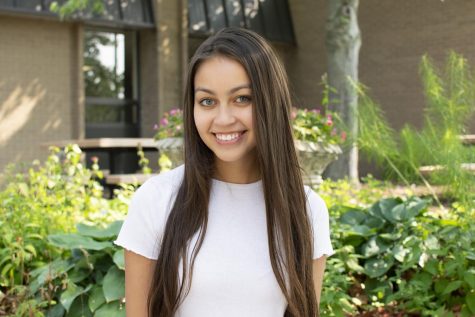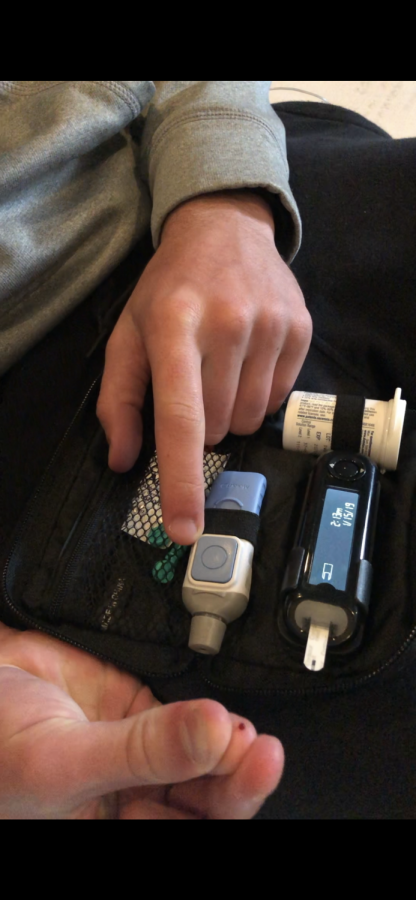Beyond the type
Student manages life with type 1 diabetes
Photo by Photo by Chloe Faris
Nicholas Lemperis, senior, pricks his finger to check his blood sugar levels. Lemperis was diagnosed with type 1 diabetes in the first couple weeks of entering high school.
Less than around 0.1 percent of the American population is affected by type 1 diabetes every day, according to the American Diabetes Association. This student is a part of that percentage.
Nicholas*, senior, was diagnosed with type 1 diabetes the first couple of weeks of transitioning into freshman year of high school. Type 1 diabetes is also known as juvenile diabetes because people are usually diagnosed when they are children.
“Nobody knows that you have diabetes until you tell them because, although it is so much work, it is just little things that people don’t notice,” Nicholas said. “Every day I am impacted by diabetes in so many ways that people wouldn’t see from the outside.”
Some of the ways include checking his blood sugar and injecting himself with insulin, sometimes even during class. These tasks have become a routine to Nicholas, despite his initial thought when getting diagnosed.
“Initially when I was diagnosed I didn’t realize how big of a deal having type 1 diabetes really is. I didn’t cry and I wasn’t super fazed about it. I thought I would just have to change my diets or other minimal changes in my life,” Nicholas said, but he soon learned otherwise. “Diabetes affects me on the daily from the second I wake up in the morning to the second I go to bed and also through the night. Throughout the day I have to take eight to ten shots with a syringe, injecting myself with insulin to make sure my blood sugar stays stable after a meal. I have to constantly prick my finger for blood so I can check my levels, and they are often too high which means I have to make more insulin, or they are often too low where I am too dizzy to continue focusing in class and I need to take a break. It’s just a constant struggle of bringing the supplies with me as well.”
Nicholas describes having type 1 diabetes as a “burden” in his life, but despite his daily struggles, he has noticed some benefits like focusing on his overall health.
“Ever since I was diagnosed I have definitely become more aware of my physical health and well being. I have had some doctors who will say sometimes type 1 diabetics are healthier than the average person because you have to become so alert and aware of your body and how you feel constantly whether your your blood sugar is dropping to dangerously low levels or very high levels,” Nicholas said. “You have to be aware of it and how to stabilize your blood sugar, which can be done by eating healthier or running or exercising. Also type 1 diabetes has totally made me more responsible as a person. It almost matures you in a way, and that’s something that not a lot of people would know.”

Along with being Editor-in-Chief of the Bear Facts magazine, Chloe is involved with Yearbook, Student Leadership, Student Council, SNAP, and Interact....


Grandma Sherrie • Jan 23, 2019 at 11:40 am
I remember when Nicholas was diagnosed with Type1 Diabetes. It was a scary time for Nicholas who, at the time, probably did not know what the diagnosis really would mean in his life.
However, Nicholas being the person he is, charged forward and learned how to live with his diagnosis. I also remember the first time, after being in the hospital, that he met friends for a burger and told us later that he gave himself an insulin shot right there at the table. Never did ask what his friends said. They must have been stunned!
So, going forward, there have the expected low days, but…. NIcholas has not let this disease get in the way of his life. Most importantly, he has not let it define him. The Nicholas I know is very talented. He is an actor, a baritone singer, an artist, a writer, a top student in his studies and one of the nicest young teens I know.
He is a “man” on the move with creative ideas. He was blessed with gifts many of us can only dream about.
God Bless You , Nicholas.